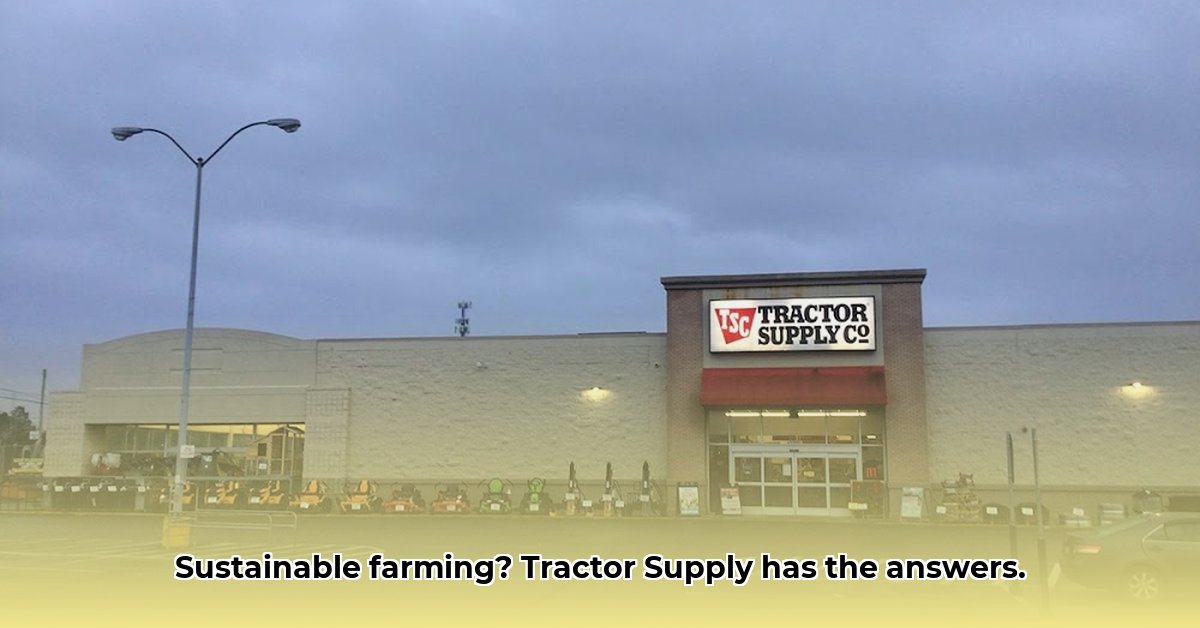
Tractor Supply in Baldwin Place offers more than just farming supplies; it's a vital resource for local farmers and gardeners committed to sustainable practices. This article explores how Tractor Supply supports sustainable agriculture, provides actionable steps for consumers to make eco-friendly choices, and highlights areas for future improvement. For more information on sustainable food plot supplies, check out this helpful resource.
Tractor Supply Baldwin Place: A Community Partner
Conveniently located near Shenorock and Mahopac Falls, Tractor Supply Baldwin Place serves a broad customer base, fostering a strong community connection. Its diverse product selection caters to everyone, from small-scale home gardeners to large-scale farmers. This accessibility is a key factor in its success in supporting sustainable agricultural practices within the community. But how effectively does it promote sustainability within its own operations?
Sustainable Practices at Tractor Supply: A Closer Look
Tractor Supply Baldwin Place stocks a range of products that promote sustainable farming methods including organic seeds, compost, and eco-friendly fertilizers. However, a comprehensive assessment of its sustainability requires examining its entire supply chain. Transparency in sourcing practices, carbon footprint reduction strategies, and the use of renewable energy sources are crucial areas needing further attention. What percentage of its products are certified organic or eco-friendly? This lack of publicly available data hinders a complete evaluation of its commitment to sustainability.
The Path to Greater Sustainability: Actionable Steps
Improving sustainability requires a collaborative effort involving Tractor Supply, consumers, and local government. Let's examine specific, actionable steps each group can take:
For Tractor Supply Baldwin Place:
Enhance Transparency: Publicly share data on your supply chain’s environmental impact, including sourcing information and carbon footprint reduction efforts. This boosts trust and empowers consumers to make informed decisions. Consider publishing regular sustainability reports. Increased transparency directly correlates with increased consumer confidence and support.
Expand Local Partnerships: Prioritize locally sourced products to reduce transportation emissions and bolster the local economy. Actively promote these products through in-store displays and online marketing to build stronger community relationships. Supporting local producers is a win-win for the environment and the community.
Invest in Education: Organize workshops and events on sustainable farming techniques (composting, water conservation, organic gardening). Partner with local experts to add credibility and attract a wider audience. This empowers customers to adopt eco-friendly practices.
For Consumers:
Ask Informed Questions: Inquire about product origins and environmental impact. Your questions drive positive change within the business model.
Make Conscious Choices: Prioritize products with credible eco-friendly certifications, indicating adherence to rigorous environmental standards. Support companies leading in sustainable practices.
Engage Actively: Participate in workshops and events to expand your knowledge and support sustainable initiatives. Collective action amplifies impact.
For Local Government:
Foster Collaboration: Partner with Tractor Supply and other stakeholders to create community-wide sustainable agriculture initiatives.
Incentivize Sustainable Practices: Offer financial incentives or tax breaks to businesses demonstrating strong commitment to environmental responsibility. This fosters a culture of sustainable innovation.
Choosing Sustainable Farming Supplies at Tractor Supply: A Practical Guide
Making sustainable choices at Tractor Supply requires careful consideration. Here's a guide to help you:
1. Seeds and Plants: Prioritize certified organic seeds and plants, and consider heirloom varieties for their resilience.
2. Soil and Fertilizers: Opt for organic soil amendments and fertilizers like compost and manure, avoiding synthetic options that can harm the environment. Check certifications which validate sustainable sourcing.
3. Pest and Weed Control: Employ Integrated Pest Management (IPM) methods, prioritizing preventative measures before resorting to chemical interventions. If necessary, use organic options such as neem oil.
4. Tools and Equipment: Invest in durable, long-lasting tools made from recycled or sustainably sourced materials, minimizing waste.
5. Packaging: Favor products with minimal or recyclable packaging, supporting companies committed to sustainable packaging practices.
Building a Sustainable Future: A Shared Responsibility
Sustainable agriculture demands collective effort. Tractor Supply plays a key role by providing access to resources, while consumers can drive change through conscious choices. Local government collaboration is crucial in creating a supportive environment for sustainable practices. By working together, we can cultivate a healthier and more prosperous future for our community.